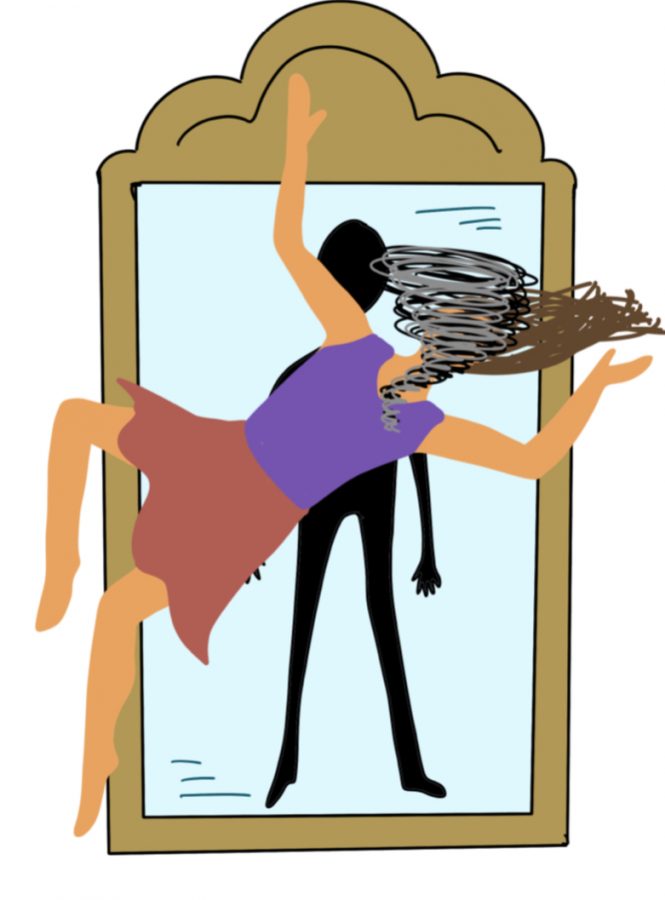Girls face misogyny in class and out of the classroom
January 25, 2021
A couple weeks ago, a group of female students did a presentation on the book “Schoolgirls” by Peggy Orenstein in my English class. The book focuses on the effects of the confidence gap and self esteem in the classroom on female students, a topic that deeply resonates with many girls I know.
As can happen in English classes, discussions can get… uncomfortable. And this one most definitely was. At one point in the conversation, the guys in my class were asked whether they’ve noticed any of the disparities that exist in the classroom around gender, and, for about 40 seconds, no one said a single thing.
- Long. Seconds.
For me, this presentation hit pretty close to home. For my entire educational career, my grades have defined who I am, both as a student and as a person. In my experience, the discrepancies in education are blatant: girls feel constant stress and pressure to perform well, or their future is at stake, yet, counterintuitively, they are also taught not to be assertive and to simply accept their fate. So, although 40 seconds of utter silence doesn’t seem like a long time, trust me. It is. So long, in fact, that I couldn’t help but text a friend in my class, “I lowkey feel like the guys are just blind to female issues,” and, four minutes later, “Okay the guys in this class are simply blind.”
In all four of English teacher Clare Georgantas’ AP Language and Composition classes, she asked the same question during the “Schoolgirls” presentation, directing it towards her male students: “what do you guys see going on here?”
“There was that kind of delayed silence in every single class,” Georgantas says. “What was interesting to me is that, when I asked that question, it was really hard for most of the guys to answer. It’s really hard to take yourself out of your privilege. It’s really hard to get in the shoes of [someone else].”
Later in the presentation, junior Maggie Irving made a comment about having her ideas invalidated by her male classmates, and, as ironic as it was, she was immediately invalidated by a boy in the class.
“As we saw in that one class we had, I was sharing about how it’s invalidating sometimes to share my opinion and immediately be shut down by [a male classmate], and then I was immediately shut down by a guy in our class,” Irving says. “It’s just frustrating, because I don’t understand why my opinion isn’t as valid.”
Unfortunately, Irving’s experience is not isolated.
“What Maggie was saying about being shut down- I heard that, I think, in every single class,” Georgantas says. “In every single class, I did have a few girls say that they feel shut down a lot by their male counterparts in class, or mansplained, or overran or [feel that] their idea is somehow just kind of snipped.”
“I feel like being a student my whole life, I’ve noticed how much I’ve been scared to share my opinion in class, because I feel like I’d be seen as less valid than my male counterparts,” Irving says.
On the other hand, the need to do well in school for many girls pushes them to share their opinions in class, despite fear of invalidation.
“I will say though, I feel like, in my classes, girls raise their hands more than guys. Maybe that’s just because they pay attention more, but, maybe, they pay attention more because they feel like they need to get good grades and everything,” senior Jake Vasilias says.
This unrelenting pressure, along with insecurity regarding their work and a fear of being assertive in the classroom can be attributed to the confidence gap. The gap has been defined by authors of “The Confidence Code: The Science and Art of Self-Assurance—What Women Should Know” by Katty Kay and Claire Shipman as “a vast confidence gap that separates the sexes. Compared with men, women don’t consider themselves as ready for promotions, they predict they’ll do worse on tests and they generally underestimate their abilities.”
In the classroom, from endless apologies to the internalization of grades, this disparity is apparent. As much as I love to act like I know a letter does not define my intelligence or my worth, the anxiety I get when the numbers start to drop speaks for itself.
“I take [my grades] really personally, because I know I put in my best work,” junior Brigid Zoltan says. “It’s hard in my mind to separate my grades from my future, because I think we’re taught that they’re so connected with getting into a good college, and then [getting] good grades [in college], and then a good job and a good future.”
The pressure is suffocating, and the need for young women to both look good and perform well bears an unrelenting weight that could crush even the strongest, most poised girls. Nationally, female students are significantly more stressed than their male classmates. According to an NYU study, 60 percent of female students reported feeling higher levels of stress on a daily basis, compared to 41 percent by their male counterparts.
Georgantas has been teaching for 26 years, and, during that time, she has recognized these patterns of self doubt and impossible expectations among her female students.
“Girls tend to be perfectionists about their work,” Georgantas sats. “And when I say perfectionists, they seem a little bit more insecure about their work in terms of needing validation much more than boys do, whereas what I find with many of the males in the classroom is that they’ll turn something in, and then the conversation will be more about, ‘why did you take points off here?’ as if I did something wrong, as opposed to the female, [who] will say, ‘what did I do wrong here?’”
And, so, the confidence gap manifests itself into the minds of impressionable young women. But where does the gap come from? Girls aren’t born with an inferiority complex, and studies have shown that girls do just as well, if not better, than their male classmates in school.
“First of all, years and years of needing external validation for things, or getting external validation about your external looks, or things like that [contribute to the gap],” Georgantas says. “[There’s a] need to feel like you look perfect on the outside, and, somehow, that’s internalized so that everything you do needs to be perfect as well.”
According to Kay and Shipman, the disparity is caused by many different factors, including upbringing, the media and biology.
“I think another thing, too, is that a lot of it is just sheer privilege; with guys, they kind of know that things are going to be okay, that they’ve already got the upperhand in the society and that they’re going to be okay. If they get a B, they don’t internalize that as part of who they are, whereas girls tend to take that a lot more seriously,” says Georgantas. “[Girls] take a B, and they internalize that as part of their whole person, whereas a guy will be like, ‘Hey, I got a B on that; that doesn’t mean that my whole confidence rests on that one B in English class. I’m good at other things; that’s not who I am.’”
This privilege and, in some cases, blatant misogyny is present not only in the classroom, but also on the field. The age old tale that boys are more suited for athletics is present from when we are young and continues to affect female participation in sports through high school. In the U.S., 60 percent of boys and only 47 percent of girls are involved in at least one organized sport by age six. In high school, the margin increases to 15 percent, which in part can be attributed to a lack of respect for female athletes.
“We’ve masqueraded disrespect as fact,” junior Sarah Sollinger says. “We let guys get away with saying, ‘Oh, she’s not as good, but it’s only because she’s not as strong as I am.’ No, you just think she’s not as good because she’s a girl.”
A couple months ago, Sollinger was playing soccer at Robert Crown with a few female friends when a couple of maskless juniors on the boys’ team approached them and asked if Sollinger and her friends wanted to play.
Now, from what I’ve seen, which, granted, is from the outside looking in, the soccer community is tight knit, yet there seems to be an immense amount of sexism throughout the program. Sollinger, who made varsity her freshman year, and her friends respectfully declined, blaming their lack of interest on the absence of masks.
“We [said] no, but the masks were not the only reason, let’s be really clear,” Sollinger says. “The guys, because we’re girls, don’t pass the ball, and we end up just standing there. So we were like, ‘No, we’re not gonna play with you.’ We’re not gonna stand on your field and do nothing.”
Later, when I asked her why the boys asked them to play in the first place, it was obvious that it wasn’t out of respect or admiration of the girls’ skills, but that the boys had been kicked off their field and wanted to use the goal that the girls were using. Maybe, out of a little kindness, too, since one of Sollinger’s friends is close friends with one of the players on the boys’ team. Either way, the answer to my question was not what it should have been.
That night, Sollinger got a text from a friend on the boys team asking her why the girls didn’t play. After explaining again that the guys weren’t wearing masks, her friend responded, and, to be blunt, it was all downhill from there.
“He was like ‘Oh, that’s fine anyways, you were the only one good enough to play with us anyway.’ And I was like, ‘what the hell do you mean by that?’” Sollinger says. “And he was like, ‘Well, you’re good, and they’re not as good. You made varsity.’”
Junior Ellie Oif was also at the field with Sollinger that day, and she made varsity last spring. Even further, the girls season was cancelled due to COVID-19 after tryouts last year, so the girls hadn’t played a full high school season since their freshman year.
“The last time he saw any of us play soccer was two years ago. So what are you basing this off of? The only thing that stayed consistent is that I’m a girl. I’ve gotten better in two years, and so have they,” Sollinger says. “It extended past that one game on that field, because you didn’t have a problem with the girls who were standing in front of you. It could’ve been those three or it could’ve been any three girls you’ve ever met.”
Having made varsity her freshman year, Sollinger rightfully earned a title that demands respect. However, without the label, and without an older brother who played on the boys’ varsity team two years earlier, it’s safe to say she would not have been deemed capable of playing with the guys.
“You get more credit for doing things within athletics as a guy than you do as a girl. I train no [fewer] hours than the boys’ varsity team does. I train the same amount of hours, I play the games for just as long. It’s the same dedication; it’s the same size field,” Sollinger says. “Why do they get so much more credit than I do? I honestly don’t know. I think it’s something much bigger than girls’ soccer at ETHS, and I think it’s much bigger than anything within girls’ athletics.”
The truth is, we do know why men hold the respect, but it’s hard to admit. Men have always held the power, creating a culture of male superiority along the way that courses through the blood of this country with every heartbeat. And yet, after hundreds of years, the female voice is still silenced. Both in the classroom and on the field, from toddlers to adulthood, men continue to be more respected. They are taught to be assertive, to demand their worth. Women, on the other hand, are taught to take what they’re given, to sit down and not disrupt, and to reflect on why they did not get more. These lessons have trickled down through generations, infiltrating the minds of young men and women alike and teaching us where we stand. Female students and athletes not only have to fight against their own confidence and expectations, but also male judgement and the smothering barriers that exist in all that we do.
“[Men] feel as if they are entitled, and I think it’s because they were taught that. You have to learn it from somewhere, I just don’t know [where]. I don’t think this is something you can put into words,” Sollinger says. “Our country is built on male superiority, and we haven’t come back from it. We’re living in a man’s world; it’s just that it’s not a man’s world anymore.”














Kevin Rielley • Feb 4, 2021 at 3:27 pm
JoJo — Excellent article. However, your grades may define you as a student, but they definitely don’t define you as a person.
Jordan Hecker • Jan 28, 2021 at 3:51 pm
You wrote exactly what I was thinking…